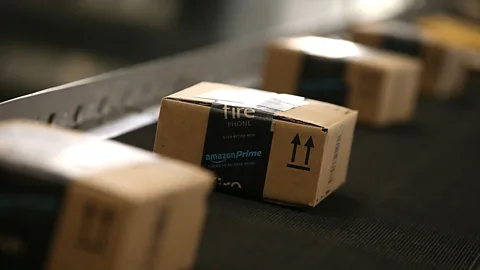Amazon’s ultimate product? Monopoly
 Getty Images
Getty ImagesThe best of the week’s long reads in science and technology, including why Amazon launches new products, the benefits of religion and the threat of a potentially catastrophic volcano.
Environment | Volcanoes and climate
If aliens were watching the Earth through telescopes during 1815, they would probably have missed the Battle of Waterloo and the birth of Otto von Bismarck, but they would surely have registered the eruption of Mount Tambora. The Earth’s atmosphere thickened with dust; the planet cooled; freak climate shifts triggered plagues and famine. Such is Nature. We might do well to prepare for another such catastrophe. (Briefing, The Economist, 3,950 words)
Philosophy | The simulation game
Thought experiment. What if we find a piece of paper telling us that the whole Universe is a simulation, ourselves included, and that the contradictions which trouble philosophers and theoretical physicists are clues left to alert us to the truth once we are intelligent enough to understand them. How would we deal with that information? “It may be that our world is unintelligible simply because it does not exist.” (Colin McGinn, Philosophical Fun, 964 words)
Technology | Peter Thiel on innovation
Transcript of Tyler Cowen’s conversation with tech entrepreneur Peter Thiel. “Always having a counterfactual sense of mission is important: If we weren’t doing this, nobody else in the world would be doing this. To the extent that’s not true, you want to make that more true.” Cowen’s interest in why Thiel thinks the way he does leads the conversation into the foothills of religion, upbringing, psychology, ethics. (Tyler Cowen, Mercatus Centre, 12,000 words)
Economics | The ultimate Amazon product
When a start-up launches a ground-breaking product, it usually gets the benefit of the doubt. The product will succeed only by meeting a demand, and who knows where the value may eventually be captured. But when Amazon launches a product ‒ Dash, Home Services ‒ different rules apply. Every launch is a bid for a monopoly. Amazon products “feel, first and foremost, like solutions to Amazon’s problems, not yours”. (John Herrman, Awl, 1,300 words)
An interview. Religion brings coherence to life by anchoring values and nourishing communities. The New Atheists are wrong to argue that religion reduces to a misplaced belief in the existence of God. You don’t have to believe in God to derive benefit from religion, but it helps. Secular culture can do some of the same work. The argument references works by Ian McEwan, Philip Pullman, Philip Roth, Roger Scruton, Virgil. (Sophie Roell, Five Books, 4,700 words)
Philosophy | Animal liberation in perspective
Animal Liberation established Peter Singer as one of the most admired and accessible philosophers of the past century, though it did not greatly change the way that people treat animals. Forty years on, Singer identifies three big open questions in animal ethics: whether it is always wrong to kill animals; how to measure well-being across species; and whether humans should intervene to stop the suffering of wild animals. (Catia Faria, Practical Ethics, 980 words)
For more articles worth reading, visit The Browser. If you would like to comment on this, or anything else you have seen on Future, head over to our Facebook or Google+ page, or message us on Twitter.
